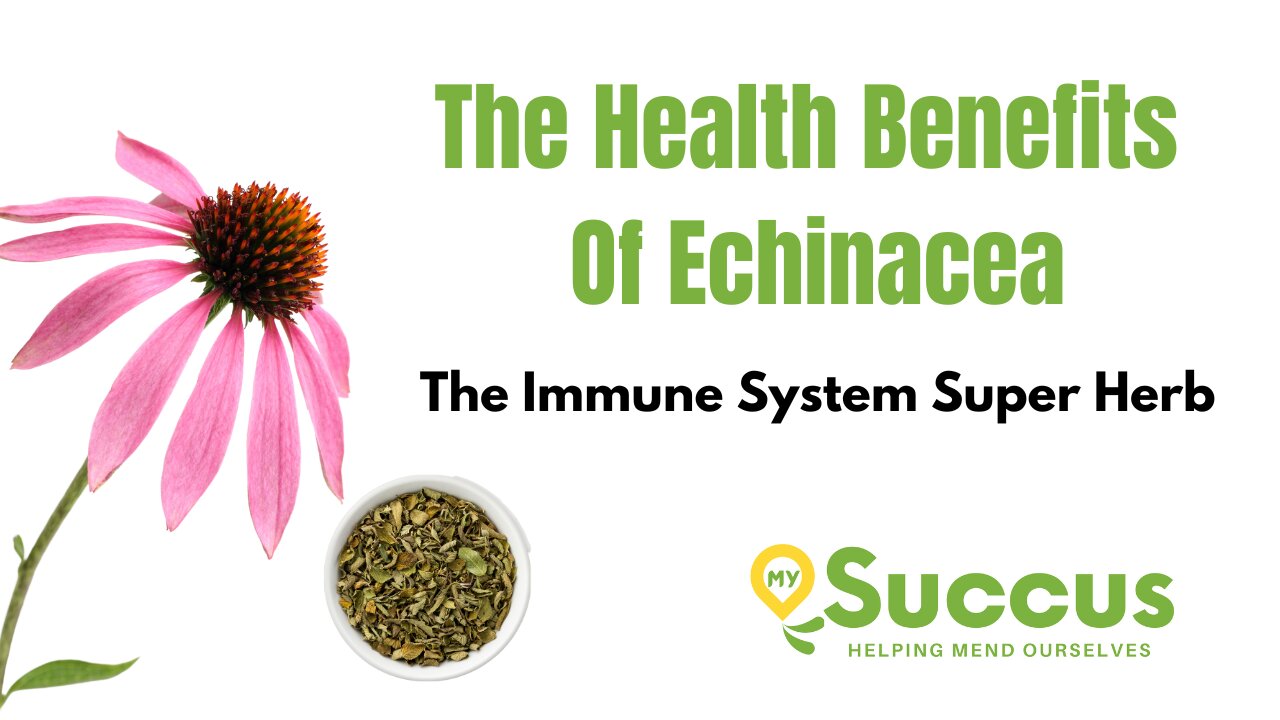Premium Only Content

The Health Benefits of Echinacea
Echinacea, also called purple coneflower, is one of the world’s most popular herbs. Native Americans have used it for centuries to treat various ailments. Today, it’s best known as an over-the-counter herbal remedy for the common cold or flu. However, it’s also used to treat pain, inflammation, migraines, and other health issues. This video reviews the benefits, uses, side effects, and dosage of echinacea. Echinacea is the name of a group of flowering plants in the daisy family. Both the plant’s upper parts and roots are used in tablets, tinctures, extracts, and teas.
Echinacea plants contain an impressive variety of active compounds and studies have linked echinacea and their compounds to many health benefits, such as reduced inflammation, improved immunity, and lower blood sugar levels. Echinacea plants are loaded with plant compounds that function as antioxidants. Antioxidants are molecules that help defend your cells against oxidative stress, a state that has been linked to chronic diseases, such as diabetes, heart disease, and others. Research on echinacea suggests that it offers several impressive health benefits.
Echinacea is best known for its beneficial effects on the immune system.
Numerous older studies have found that this plant may help your immune system combat infections and viruses, which could help you recover faster from illness. That’s one reason why echinacea is often used to prevent or treat the common cold. In fact, one review found that echinacea could reduce the risk of developing an upper respiratory tract infection by 22%. Test-tube studies have found that echinacea plants may help lower blood sugar levels. In a test-tube study, an Echinacea extract was shown to suppress enzymes that digest carbohydrates. In theory, this means that echinacea might be able to reduce the amount of sugar entering your blood. Other animal studies suggest that the antioxidants found in echinacea could help improve blood sugar and insulin sensitivity.
Still, human-based research on the effects of echinacea on blood sugar is lacking. Anxiety is a common problem that is estimated to affect nearly 7% of adults in the United States. In recent years, echinacea plants have emerged as a potential aid for anxiety. Some older research has discovered that echinacea plants contain compounds that may reduce feelings of anxiety. These include alkamides, rosmarinic acid, and caffeic acid. One study found that taking 40 milligrams (mg) of echinacea extract twice daily for 7 days significantly reduced anxiety. Inflammation is your body’s natural way of promoting healing and defending itself. Sometimes inflammation can get out of control and last for longer than necessary and expected. This may increase your risk of chronic diseases and other health problems. Several studies have shown that echinacea can help reduce excess inflammation. In another 30-day study, adults with osteoarthritis found that taking a supplement containing ginger extract and echinacea extract significantly reduced inflammation, chronic pain, and swelling. Interestingly, these adults did not respond well to conventional non-steroidal inflammatory drugs (NSAIDS) but found the supplement containing echinacea and ginger extract helpful. Research has shown that echinacea plants may help treat common skin concerns.
In one study, a supplement containing a botanical extract derived from eggplant and echinacea was effective at improving mild to moderate acne. In another 2010 study in 10 people, skin care products containing echinacea extract were found to improve skin hydration and reduce wrinkles. Similarly, a cream containing Echinacea extract was shown to improve eczema symptoms and help repair the skin’s thin, protective outer layer. However, echinacea extract appears to have a short shelf life, making it difficult to incorporate into commercial skin care products.
Cancer is a disease that involves the uncontrolled growth of cells.
Test-tube studies have shown that echinacea extracts may suppress cancer cell growth and even trigger cancer cell death. In one 2012 test-tube study, an extract of Echinacea was shown to trigger cancer cell death. In another older test-tube study, extracts from echinacea plants killed human cancer cells from the pancreas and colon by stimulating a process called apoptosis, or controlled cell death. It’s believed that this effect occurs due to echinacea’s immune-boosting properties.
There was some concern that echinacea could interact with conventional cancer treatments, such as doxorubicin, but older studies have found no interaction. Though rare, some people may also be allergic to echinacea, which can cause side effects like hives, swelling, and anaphylaxis, a severe allergic reaction. As echinacea appears to stimulate the immune system, people with autoimmune disorders or people taking immunosuppressive drugs should avoid it or consult a doctor first.
-
 1:13:35
1:13:35
Glenn Greenwald
3 hours agoCharlie Kirk Assassinated; NATO Alleges Russian Drones Flew Over Poland, and More | SYSTEM UPDATE #512
134K110 -
 LIVE
LIVE
Redacted News
3 hours agoTurning the Tide: 9/11 Justice in 2025 — Day 1 with Sen. Ron Johnson, Richard Gage and More
2,538 watching -
 LIVE
LIVE
LFA TV
14 hours agoBREAKING: CHARLIE KIRK ASSASSINATED - WEDNESDAY 9/10/25
2,034 watching -
 LIVE
LIVE
Badlands Media
16 hours agoAltered State S3 Ep. 45
1,102 watching -
 LIVE
LIVE
Dr Disrespect
9 hours ago🔴LIVE - DR DISRESPECT - THE FINALS - NEW SEASON 8 LAUNCH EVENT W/ THE SHOTTY BOYS
926 watching -
 LIVE
LIVE
TheSaltyCracker
1 hour agoYou're Being Hunted ReeEEStream 9-10-25
16,042 watching -
 LIVE
LIVE
RealAmericasVoice
2 days agoHOME OF REAL NEWS
13,438 watching -
 27:00
27:00
BonginoReport
4 hours agoRest In Peace Charlie Kirk - Nightly Scroll w/ Hayley Caronia (Ep.131) - 09/10/2025
154K270 -
 1:20:06
1:20:06
Kim Iversen
4 hours agoRIP Charlie Kirk: When Words Fail, They Reach for Guns
108K167 -
 2:47:04
2:47:04
DDayCobra
6 hours ago $14.27 earnedCharlie Kirk SHOT
109K38